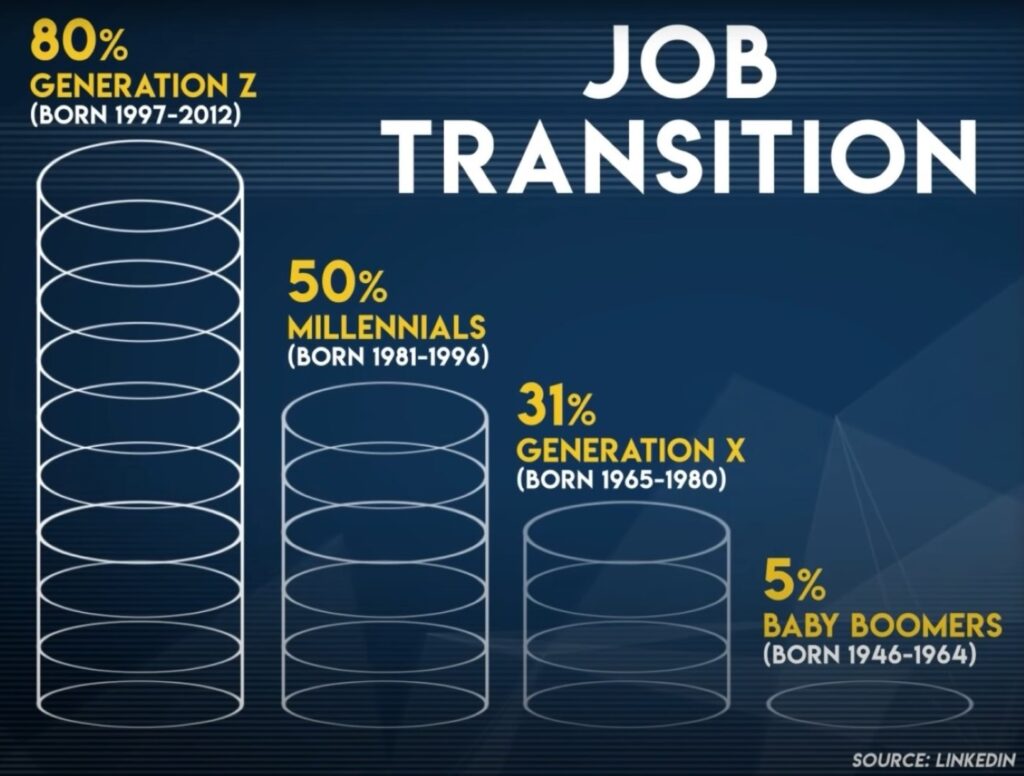- PEOPLE WORLDWIDE ARE QUITTING THEIR JOBS
- PEOPLE WORLDWIDE ARE QUITTING THEIR JOBS
- 41% OF WORKERS WANT TO QUIT THEIR JOBS THIS YEAR (Microsoft)
- 95% OF AMERICANS WANT TO QUIT THEIR JOBS THIS YEAR (Monster.com)
- IN INDIA ALONE, THE ATTRITION RATE IN THE TECH SECTOR IS UP 23% (WION)
Hi I AM DEBASHISH BHATTACHARJEE (Founder of Pocket52) & WE ARE IN THE MIDDLE OF ‘THE GREAT RESIGNATION’ Aka PANDEMIC EPIPHANY
- Why are people leaving their jobs?
- Where are they going?
- Should you consider quitting too?
- If you’re an employer, what should you do?
__________________________________________________________________
I promise to discuss all of it, but let’s start with some numbers first.
- Microsoft conducted a survey; it found that 41% of employees worldwide are looking to quit their jobs this year.
- In the United States alone, 4.3 million people quit their jobs in August last year, 4.3 million people, that’s 2.9% of America’s working population. 20 million Americans have left their job since April 2021
- In Germany, 1/3rd of the companies are short of skilled workers. Currently, there are at least 400000 skilled job vacancies.
- Data collected from The Organization for Economic Co-operation and Development (OECD) shows that in 38 member countries, at least 20 Million workers have not returned to work since the Wuhan virus struck.
- In India alone, 1 Million Indian IT Employees Will Resign In 2021; a Record Attrition Rate Of 23% is Expected.
- In Vietnam, many low-paid garment workers have not returned to factories.
- in the Caribbean, one in every six workers aged 18 to 29 has left the workforce
- In China, there’s a shortage of workers in the tech sector.
__________________________________________________________________

🙌Welcome to ‘The Great Resignation’ 🙌
Why did people start quitting their jobs?
- ❌ Unemployment Benefits – Check
- ❌ Inadequate Pay – Check
- ❌ Caregiving – Check
- ❌ Relocation – Check
- ❌ Fear of in-person interaction check & check
__________________________________________________________________
But all of this is just half the story; not everyone is leaving because of unemployment benefits from their government or private organizations
- or because they have to care for a child
- or an elderly at home
- or because their family has relocated during the pandemic
__________________________________________________________________
The Elephant in the room is the work-life balance ⚖️️ you see, for years, our lives have revolved around our work.
The ‘7 We’ of our past life
- we planned our week based on our work calendar 📅
- we met people only over weekends 🏄
- we socialized only on off days 🔗
- we skipped weddings 🧖♀️🧖♂️for work
- we prioritized work meetings over parent-teacher👩🏫 meetings
- we compromised on vacations🎅to save unpaid leaves
__________________________________________________________________
The pandemic has changed all of this. It held up the mirror. It forced people to see the unpredictability of life to reflect on what matters to them. Many realized it was not working or at least not their present work, so millions began reimagining their lives.
The ‘6 Many’ of our decision-making
- Many locked up their city homes and moved to the suburbs. They realized they didn’t want to wait until retirement for greener pastures.
- Many quit full-time jobs and began freelancing. They realized they wanted to spend more time at home or with family.
- many decided to quit and go back to school; they realized life is too short to stick it out in the wrong career
- many turn their hobbies into full-time jobs
- many began trading full-time at least 106 Million people around the world today are trading in cryptocurrency, and this is as of February 2021, the numbers indeed have gone up since courtesy of the raging crypto
- many people who decided to startup
__________________________________________________________________
A startup boom has accompanied the great resignation. Let me show you some more numbers 🙂
- the year the pandemic struck, 1.4 million startups were registered
- India added 1600 startups in the tech sector alone.
- those who did not have the capital for a startup or the skill set to look for new jobs decided to stay back in their villages
- No wonder the great resignation is also being called a workers revolution. It’s a legacy of the pandemic. It gave people newfound respect for themselves and their lives.
__________________________________________________________________
A survey asked people why they quit their jobs
- 40% cited burnout
- 20% spoke about the lack of flexibility
- 16% said the previous employer was not supporting their well-being
__________________________________________________________________
So what were they looking for in their new jobs?
- 40% said the ability to work remotely according to personal preference that what people want you to see. People today don’t want their lives to revolve around their jobs anymore. They want their careers to fit into the kind of life they want to live.
- A parent raising a child wants a job where they can take time off every day to drop the little one off to soccer.
- a 25-year-old may not want to slog it out 10 hours a day anymore; he may want to work five hours a day and wants an employer who would respect that some may want to work from home for the rest of their lives
- Today people are looking for jobs that are flexible and remote, have shorter work days, that have four-day work weeks.
- People want a job that helps them maintain a work-life balance period.
- Every significant event in history has affected our economic decisions.
- During World War I, when men went to the battlefields to fight, women entered factories for the first time to keep them running.
- After the great depression, people clung to their jobs.
- In the mid-90s, they were switching jobs again.
- After the great recession, the trend of sticking to jobs was back; people wanted a safety net.
- Then came the pandemic; it gave people another reality check on life, those who survived the virus value their lives way too much to compromise.
__________________________________________________________________
LinkedIn studied the trend it found that the percentage of LinkedIn members who updated their profiles and found a job has increased 54% year on year

- Gen-Z switched the most their job transition increased by 80%
- Millennials were next
- then Gen-X and finally
- the Boomers.
Sectors suffering the most because of the great resignation include hospitality and health care, so this was the employee’s side of the story, let’s now look at the employers; the first year of the pandemic was challenging enough that offices were closed when they reopened, supply bottleneck strangled operations, and now workers are quitting; it’s like being out of the frying pan into the fire there are currently 10 million job openings in the United States, Germany needs at least 400000 workers
What are companies doing to retain their talent?
some companies are offering higher increments and bonuses; reports say wages for low-paid workers are rising at the fastest rate since the great recession; some employers are even giving collective holidays; German e-commerce company Zalando, for example, offered the staff a collective leave the company shut down its offices in the first week of august so that all employees could take a break some companies are giving coupons for food delivery
These benefits are exciting, but
- if a company is to survive the great resignation, it must take deep dive into employee’s minds and see what they want
- Flexibility is the term; companies must allow people to continue working from home if they want to and not penalize their career growth; they must change the hybrid model for the good.
- they must become diverse, and by that, I mean not just high people from different social backgrounds or people who look other than diversity needed; they should also look for employees with different needs
- if a parent wants to take an hour out every day for their child, let them; if someone wants to work from home, let them,
- Rearrange your human resources in a way that enables flexibility because today, a paycheck is no longer enough, and companies must realize this; they must also recognize that employees are tired; many are grieving they need to be given a reason to return to work every Monday.
- so give them better health policies, come up with better family engagement policies, reward your employees make them feel valued
__________________________________________________________________
it’s time to:
- Reimagine work
- Reimagine office culture
- Reimagine leadership
because if you don’t, some other company will, and you will lose out in the race for talent
__________________________________________________________________
Next question: what should you do? Should you quit your job or continue working where you are right now?
for the record, I’m not glorifying resignation; I’m simply doing my job, which by the way, I’m pretty happy doing, and that is to tell you what’s going on via this article, so it’s for you to decide
- What do you want to do?
- What suits your economic situation?
- What helps you pay your loans?
- What enables you to support your family, you alone know?
- What works for you is the safety of a 9-to-5 job or the flexibility of freelancing?
__________________________________________________________________
You see, soul-searching is all nice and good, but survival is the battle that you alone need to fight, so if you’re content in your current workplace if you like what you do. The people you work with, if you have a job that pays your bills and shows your growth, a job you’re happy to return to every Monday, then why fall for the great resignation.
About Debashish Bhattacharjee: Before his PhD. in Marketing he learned how to grow tech products & companies when he was 14 Yrs old – as a student < working stiff < a senior professional < marketer < product evangelist & now again as an Entrepreneur turned professional Leader. Across 50+ cities & 18+ Yrs of Professional Exp. he made two of the best startups in Ed-Tech & Gaming, post-Series-B-Funding, and later sold at a valuation of $13 MILLION+. Worked extensively in & with P&L, AOP, Growth & Agile Teams, Business, Marcom & MarTech, SAAS, MOBILE/GSM & Telco Entrepreneurship/Valuations/Cap-Tables/M&A, L&D, Travel-Tech Industrial Automation, Edtech, Gaming sectors & verticals. linkedin.com/in/bhattacharjee-debashish



